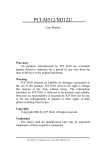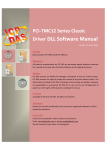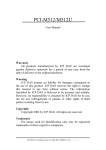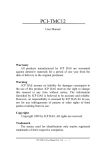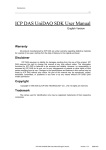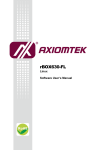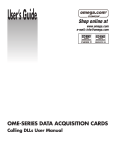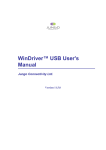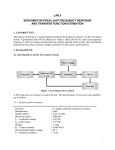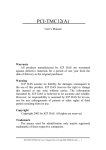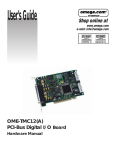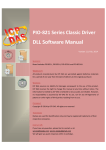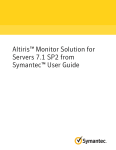Download OME-TMC12 Software Manual
Transcript
User’s Guide Shop online at www.omega.com e-mail: [email protected] OME-TMC12 PCI-Bus Digital I/O Board Software Manual OMEGAnet ® Online Service www.omega.com Internet e-mail [email protected] Servicing North America: USA: ISO 9001 Certified Canada: One Omega Drive, P.O. Box 4047 Stamford CT 06907-0047 TEL: (203) 359-1660 e-mail: [email protected] 976 Bergar Laval (Quebec) H7L 5A1, Canada TEL: (514) 856-6928 e-mail: [email protected] FAX: (203) 359-7700 FAX: (514) 856-6886 For immediate technical or application assistance: USA and Canada: Sales Service: 1-800-826-6342 / 1-800-TC-OMEGA® Customer Service: 1-800-622-2378 / 1-800-622-BEST® Engineering Service: 1-800-872-9436 / 1-800-USA-WHEN® TELEX: 996404 EASYLINK: 62968934 CABLE: OMEGA Mexico: En Español: (001) 203-359-7803 FAX: (001) 203-359-7807 e-mail: [email protected] [email protected] Servicing Europe: Benelux: Postbus 8034, 1180 LA Amstelveen, The Netherlands TEL: +31 (0)20 3472121 FAX: +31 (0)20 6434643 Toll Free in Benelux: 0800 0993344 e-mail: [email protected] Czech Republic: Frystatska 184, 733 01 Karviná, Czech Republic TEL: +420 (0)59 6311899 FAX: +420 (0)59 6311114 Toll Free: 0800-1-66342 e-mail: [email protected] France: 11, rue Jacques Cartier, 78280 Guyancourt, France TEL: +33 (0)1 61 37 29 00 FAX: +33 (0)1 30 57 54 27 Toll Free in France: 0800 466 342 e-mail: [email protected] Germany/Austria: Daimlerstrasse 26, D-75392 Deckenpfronn, Germany TEL: +49 (0)7056 9398-0 Toll Free in Germany: 0800 639 7678 e-mail: [email protected] United Kingdom: ISO 9002 Certified FAX: +49 (0)7056 9398-29 One Omega Drive, River Bend Technology Centre Northbank, Irlam, Manchester M44 5BD United Kingdom TEL: +44 (0)161 777 6611 FAX: +44 (0)161 777 6622 Toll Free in United Kingdom: 0800-488-488 e-mail: [email protected] It is the policy of OMEGA to comply with all worldwide safety and EMC/EMI regulations that apply. OMEGA is constantly pursuing certification of its products to the European New Approach Directives. OMEGA will add the CE mark to every appropriate device upon certification. The information contained in this document is believed to be correct, but OMEGA Engineering, Inc. accepts no liability for any errors it contains, and reserves the right to alter specifications without notice. WARNING: These products are not designed for use in, and should not be used for, patient-connected applications. OME-PCI-TMC12(A) Software User’s Manual OME-PCI-TMC12(A) Software User’s Manual (Ver 2.0, Dec/2002) ----- 1 Tables of Contents 1. INTRODUCTION................................................................................................4 1.1 1.1.1 1.1.2 1.1.3 1.1.4 1.1.5 INSTALLATION QUICK START..........................................................................6 2. Step 1: Software Installation..................................................................6 Step 2: Check the installed software......................................................8 Step 3: Hardware Installation .............................................................10 Step 4: Hardware Diagnostic ..............................................................10 Step 5: Muti-Board Diagnostic............................................................13 DLL DRIVER.....................................................................................................14 FIND THE BOARD NUMBER ...........................................................................18 FUNCTIONS OF TEST......................................................................................19 2.1 2.2 2.2.1 PTMC12_FloatSub ..............................................................................19 2.2.2 PTMC12_ShortSub ..............................................................................19 2.2.3 PTMC12_IntSub ..................................................................................20 2.2.4 PTMC12_GetDllVersion .....................................................................20 2.3 FUNCTIONS OF DRIVER INITIALIZATION ........................................................21 2.3.1 PTMC12_DriverInit.............................................................................21 2.3.2 PTMC12_DetectBoards.......................................................................21 2.3.3 PTMC12_OpenBoard ..........................................................................22 2.3.4 PTMC12_ReadBoardStatus.................................................................23 2.3.5 PTMC12_ReadId .................................................................................24 2.3.6 PTMC12_CloseBoard..........................................................................25 2.3.7 PTMC12_CloseAll ...............................................................................25 2.4 READ/WRITE TO OME-PCI-TMC12(A).......................................................26 2.4.1 PTMC12_WriteByte.............................................................................26 2.4.2 PCITMC12_WriteWord .......................................................................27 2.4.3 PTMC12_ReadByte..............................................................................28 2.4.4 PTMC12_ReadWord............................................................................29 2.5 INTERRUPT RELATED DLLS ..........................................................................30 2.5.1 PTMC12_InstallCallBackFunc ...........................................................30 2.5.2 PTMC12_RemoveAllCallBackFunc ....................................................31 2.5.3 PTMC12_EnableInt .............................................................................32 2.5.4 PTMC12_DisableInt ............................................................................32 2.6 READ/WRITE TO PCI CONTROLLER ..............................................................33 2.6.1 2.6.2 PTMC12_WritePciDword ...................................................................33 PTMC12_ReadPciDword ....................................................................34 OME-PCI-TMC12(A) Software User’s Manual (Ver 2.0, Dec/2002) ----- 2 3. DEMO PROGRAM ...........................................................................................35 3.1 3.2 PROGRAM ARCHITECTURE ............................................................................36 REPORT PROBLEMS .......................................................................................39 OME-PCI-TMC12(A) Software User’s Manual (Ver 2.0, Dec/2002) ----- 3 1. Introduction The demo programs, written in VC++, VB, Delphi, and BCB++, are provided in the companion CD. These demo programs will call the DLL, PCITMC12.DLL, to access the hardware of OME-PCI-TMC12. The PCITMC12.DLL will call the kernel driver, Windrvr.vxd or Windrvr.sys (For Win2000/XP as follows: VC++ demo program VB demo program Delphi demo program BCB++ demo program User mode (Same for 95/98/NT/2000XP) PCITMC12.DLL Windrvr.vxd Windrvr.sys (For 95/98) (For WinNT/2000/XP) Kernel mode The install shield will install kernel driver, DLL driver & application demo program to system. All demo program & DLL are same for 95/98/NT/2000/XP. But the kernel drivers are different for different systems as follows: z for windows 95/98 Æ will copy WINDRVR.VXD to C:\WIN95\SYSTEM\VMM32 z for windows NT/2000 Æ will copy WINDRVR.SYS to C:\WINNT\SYSTEM32\DRIVERS z for windows XP Æ will copy WINDRVR.SYS to C:\WINDOWS\SYSTEM32\DRIVERS (Note: 2000 & XP use the same driver) OME-PCI-TMC12(A) Software User’s Manual (Ver 2.0, Dec/2002) ----- 4 The DLLs & demo programs will not work if the kernel driver is not installed correctly. The install shield will copy the correct kernel driver to correct position if you select correct O.S.(95/98, NT, 2000, XP). The install shield also copy all related documentations of OME-PCITMC12(A) to user’s hard disk. Refer to CallDll.pdf for more information about how to call the DLL functions with VC++5, VB5, Delphi3 and Borland C++ Builder 3. Refer to step 5 of Sec. 1.1.2 for more information. The software architecture is given as follows: Initialize the Kernel Driver Detect OME-PCI-TMC12(A) PTMC12_DriverInit() PTMC12_DetectBoards() PTMC12_OpenBoard(…) …. …. Open OME-PCI-TMC12(A) Access I/O Access I/O PTMC12_ReadWord(…) …….. …….. PTMC12_WriteWord(…) ….. PTMC12_CloseAll() Close OME-PCI-TMC12(A) Note: 1. OME-PCI-TMC12 (A) maybe OME-PCI-TMC12 or OME-PCI-TMC12A. Refer to Sec. 3.4 of “OME-PCI-TMC12 (A) User’s Manual” (not this manual) for comparison of TMC12 & TMC12A. 2. PTMC12.DLL is designed for OME-PCI-TMC12. 3. If J28 of OME-PCI-TMC12A is set to OME-PCI-TMC12, it can use PTMC12.DLL as same as OME-PCI-TMC12. OME-PCI-TMC12(A) Software User’s Manual (Ver 2.0, Dec/2002) ----- 5 1.1 Installation Quick Start The OME-PCI-TMC12 can be used in Windows 95/98/NT/2000/XP. The recommended installation steps are given in Sec 1.1.1 ~ Sec. 1.1.4 1.1.1 Step 1: Software Installation Step 1: insert the companion CD in the CD-ROM drive. Following screen should appear: Step 2: click the first item, Toolkits (Software)/Manuals OME-PCI-TMC12(A) Software User’s Manual (Ver 2.0, Dec/2002) ----- 6 Step 3: click the first item, PCI Bus DAQ Card Step 4: click the last item, OME-PCI-TMC12 Step 5: click the appropriate item, example - Install Toolkit for Windows NT Then the install shield will install kernel driver, DLL driver & application demo program to system. All demo programs & DLLs are same for 95/98/NT/2000/XP. But the kernel driver is different for different systems as follows: z for windows 95/98 Æ will copy WINDRVR.VXD to C:\WIN95\SYSTEM\VMM32 z for windows NT/2000 Æ will copy WINDRVR.SYS to C:\WINNT\SYSTEM32\DRIVERS z for windows XP Æ will copy WINDRVR.SYS to C:\WINDOWS\SYSTEM32\DRIVERS (Note: 2000 & XP use the same driver) The DLLs & demo programs will not work if the kernel driver is not installed correctly. The install shield will copy the correct kernel driver to correct position if you select correct O.S. (95/98, NT, 2000, XP). OME-PCI-TMC12(A) Software User’s Manual (Ver 2.0, Dec/2002) ----- 7 1.1.2 Step 2: Check the installed software Assume you use the default directory & name of install shields, the software will be installed in C:\DAQPRO as follows: Step 1: click C:\OMEGA as follows: Step 2: click PCI-TMC12 as follows: Demo Driver Inf Manual ReadMe Æ demo program Æ DLL Æ for plug & play Æ windows 98/2000/XP need this information Æ user’s manual & other literature, refer to chapter 3 for more information Æ Read this file for more information Step 3: click Inf as follows: OME-PCI-TMC12.inf Æ inf file for windows 98/2000/XP. OME-PCI-TMC12(A) Software User’s Manual (Ver 2.0, Dec/2002) ----- 8 PnPInstall Æ read this file for plug & play installation steps. Note: 95 & NT 4.0 do not need this file. Step 4: Click PnPInstall to read this PDF file for plug & play installation. For Windows 98/2000/XP, system will auto detect the OME-PCI-TMC12 & ask you to install software driver. Read this PDF file carefully if you are not familiar with plug & play installation. You will need it in next steps. Step 5: Back to the previous directory & click Manual as follows: CallDll.pdf Æ how to call DLL by VC, VB, Delphi & BCB++ ResCheck Æ how to check the allocated system resource of OME-PCI-TMC12 Step 6: Back the previous directory & click Demo as follows: Bcb4 Delphi4 VB6 VC6 VCPP Æ demo program for BCB 4.0 Æ demo program for Delphi 4.0 Æ demo program for VB 6.0 Æ demo program for VC 6.0, C language Æ demo program for VC 6.0, C++ language Step 7: click VB6 as follows: DioTest Æ Test D/I/O of OME-PCI-TMC12 DllTest Æ test DLL driver & detect OME-PCI-TMC12 ---------------------------------------------------------------------------------TestDio2 Æ Write D/O then read D/I of two OME-PCI-TMC12 cards TestId2 Æ Show IDs of two OME-PCI-TMC12 cards Step 8: shutdown & power off your PC OME-PCI-TMC12(A) Software User’s Manual (Ver 2.0, Dec/2002) ----- 9 1.1.3 Step 3: Hardware Installation Step 1: Install your OME-PCI-TMC12(A) in the PC Step 2: Power on your PC Step 3: Now 98/2000/XP will find a OME-PCI-TMC12 card & ask user to provide Plug & Play driver. Refer to PnPInstall.pdf, step3 of Sec. 1.1.2, for more information. 1.1.4 Step 4: Hardware Diagnostic Step 1: run DllTest of VB demo program as follows: (step7 of Sec. 1.1.2) z Click Initial Steps first to check the kernel driver, DLL & PCITMC12DetectCards() z Check the value of PCITMC12_DriverInit must be 0 z Click ReadId to show the IDs of selected OME-PCI-TMC12 in this PC The IDs of OME-PCI-TMC12(A) cards are as follows: z z z z Vendor ID Device ID Sub-vendor ID Sub-device ID = = = = 10B5 9050 2129 9912 Note: The TMC12 & TMC12A have identical IDs. OME-PCI-TMC12(A) Software User’s Manual (Ver 2.0, Dec/2002) ----- 10 Step 2: z Install a 20-pin flat cable between CON2 & Con3 of OME-PCI-TMC12(A) z run DioTest of VB demo program as follows: (step7 of Sec. 1.1.2) z Click R/W D/I/O to write to D/O & Read D/I as follows: (write-data is given in Write to D/O) z Change &H5555 to &HAAAA & Click R/W D/I/O as follows: Note: if the 20-pin flat cable is not installed, the D/I will be &HFFFF OME-PCI-TMC12(A) Software User’s Manual (Ver 2.0, Dec/2002) ----- 11 Step 3: run LedTest of VB demo program as follows: (step7 of Sec. 1.1.2) z z z z Click Write to LedXor & check LED1=OFF, LED2=OFF & LED3= OFF Change &HE000 to &H6000 Click Write to LedXor & check LED1=OFF, LED2=OFF & LED3= ON Change &H6000 to &HA000 z z z z z Click Write to LedXor & check LED1=OFF, LED2=ON & LED3= OFF Change &H6000 to &HA000 Click Write to LedXor & check LED1=ON, LED2=OFF & LED3= OFF Change &HA000 to &HE000 Click Write to LedXor & check LED1=OFF, LED2=OFF & LED3= OFF OME-PCI-TMC12(A) Software User’s Manual (Ver 2.0, Dec/2002) ----- 12 1.1.5 Step 5: Muti-Board Diagnostic Step 1: run TestId2 of VB demo program to read & show IDs of two OME-PCITMC12(A) as follows: (step7 of Sec. 1.1.2) Step 2: run TestDio2 of VB demo program to read/write D/I/O of two OME-PCITMC12(A) as follows: (step7 of Sec. 1.1.2) OME-PCI-TMC12(A) Software User’s Manual (Ver 2.0, Dec/2002) ----- 13 2. DLL Driver The included software is a collection of subroutines for OME-PCITMC12(A) cards for Windows 95/98/NT/2000/XP applications. These subroutines are written with C language and perform a variety of digital I/O operations. The names of the subroutines in PCITMC12.DLL have logical names to simplify its usage. It provides powerful, easy-to-use subroutines for developing your data acquisition application. Your program can call these DLL functions by VC++, VB, Delphi, and BORLAND C++ Builder easily. To speed-up your developing process, some demonstration source program are provided. Please refer to the following user manuals: (refer to step2 of Sec. 1.1.2 for more information) • PnPInstall.pdf: (Step 3 of Sec. 1.1.2) Install the PnP (Plug and Play) driver for PCI card under Windows 95/98. • SoftInst.pdf: (Step 3 of Sec. 1.1.2) Install the software package under Windows 95/98/NT/2000/XP. • CallDll.pdf: (Step 5 of Sec. 1.1.2) Call the DLL functions with VC++5, VB5, Delphi3 and Borland C++ Builder 3. • ResCheck.pdf: (Step 5 of Sec. 1.1.2) Check the resources I/O Port address, IRQ number and DMA number for add-on cards under Windows 95/98/NT. OME-PCI-TMC12(A) Software User’s Manual (Ver 2.0, Dec/2002) ----- 14 The install shield will install kernel driver, DLL driver & application demo programs. All DLL driver & demo programs are same for all windows operating systems (95/98/NT/2000/XP). But the kernel drivers are different for different system as follows: z for windows 95/98 Æ will copy WINDRVR.VXD to C:\WIN95\SYSTEM\VMM32 z for windows NT/2000 Æ will copy WINDRVR.SYS to C:\WINNT\SYSTEM32\DRIVERS z for windows XP Æ will copy WINDRVR.SYS to C:\WINDOWS\SYSTEM32\DRIVERS The DLL & demo programs will not work if the kernel driver is not installed correctly. The install shield will copy the correct kernel driver to correct position if you select correct O.S.(95/98, NT, 2000, XP). After the software driver is installed, the related header file & declaration files are given as follows: |--\Demo |--\BCB4 | |--\PCITMC12.H | +--\PCITMC12.LIB | |--\Delphi4 | +--\PCITMC12.PAS | |--\VB6 | +--\PCITMC12.BAS | +--\VCPP6 |--\PCITMC12.H +--\PCITMC12.LIB Å demo program Å for Borland C++ Builder 4 Å Header file Å Linkage library for BCB4 only Å for Delphi 4 Å Declaration file Å for Visual Basic 6 Å Declaration file Å for Visual C++ 6 Å Header file Å Linkage library for VC++6 only OME-PCI-TMC12(A) Software User’s Manual (Ver 2.0, Dec/2002) ----- 15 In this chapter, we use some keywords to indicate the attribute of Parameters. Keyword Is Parameter Set by user before calling this function ? Does user Get Data/Value from this parameter after calling this function ? [Input] Yes No [Output] No Yes [Input, Output] Yes Yes Note: Spaces need to be allocated for all of the parameters by the user. The return codes of DLLs are defined as follows: // return code #define PCI_NoError 0 #define PCI_DriverOpenError 1 #define PCI_DriverNoOpen 2 #define PCI_GetDriverVersionError 3 #define PCI_InstallIrqError 4 #define PCI_ClearIntCountError 5 #define PCI_GetIntCountError 6 #define PCI_RegisterApcError 7 #define PCI_RemoveIrqError 8 #define PCI_FindBoardError 9 #define PCI_ExceedBoardNumber 10 #define PCI_ResetError 11 #define PCI_IrqMaskError 12 #define PCI_ActiveModeError 13 #define PCI_GetActiveFlagError 14 #define PCI_ActiveFlagEndOfQueue 15 #define PCI_BoardIsNotOpen 16 #define PCI_BoardOpenError 17 #define PCI_BoardNoIsZero 18 #define PCI_BoardNoExceedFindBoards 19 #define PCI_InputParameterError 20 #define PCI_IntInitialStateError 21 #define PCI_IntInitialValueError 22 #define PCI_TimeOut 23 OME-PCI-TMC12(A) Software User’s Manual (Ver 2.0, Dec/2002) ----- 16 The defined DLL are given as follows: Functions of test, Refer to Sec. 2.2 z float PTMC12_FloatSub(float fA, float fB); z short PTMC12_ShortSub(short nA, short nB); z int PTMC12_IntSub(int iA,int iB); z DWORD PTMC12_GetDllVersion(void); Functions of Driver Initialization, Refer to Sec. 2.3 z DWORD PTMC12_DriverInit(void); z DWORD PTMC12_DetectBoards(void); z DWORD PTMC12_OpenBoard(DWORD dwBoardNo, DWORD dwInEnable); z DWORD PTMC12_ReadBoardStatus(DWORD dwBoardNo); z DWORD PTMC12_ReadId(DWORD dwBoardNo, DWORD *dwVendorId, DWORD *dwDeviceId, DWORD *dwSubVendorId, DWORD z z *dwSubDeviceId); DWORD PTMC12_CloseBoard(dwBoardNo); void PTMC12_CloseAll(void); Functions of Read/Write to OME-PCI-TMC12(A), Refer to Sec. 2.4 z DWORD PTMC12_Writeyte(DWORD dwBoardNo, DWORD dwOffset, BYTE Data); z DWORD PTMC12_WriteWord(DWORD dwBoardNo, DWORD dwOffset, WORD Data); z DWORD PTMC12_ReadByte(DWORD dwBoardNo, DWORD dwOffset, BYTE *Data); z DWORD PTMC12_ReadWord(DWORD dwBoardNo, DWORD dwOffset, WORD *Data); Functions of Interrupt, Refer to Sec. 2.5 z DWORD PTMC12_InstallCallBackFunct(DWORD dwBoardNo, dwInitialState, void(* addrCallBackFunc)()); z DWORD PTMC12_RemoveAllCallBackFunc(void); z DWORD PTMC12_EnableInt(DWORD dwBoardNo); z DWORD PTMC12_DisableInt(DWORD dwBoardNo); DWORD Functions of Read/Write to PCI Controller, Refer to Sec. 2.6 z DWORD PTMC12_WritePciDWord(DWORD dwBoardNo, WORD Data); z DWORD PTMC12_ReadPciDword(DWORD dwBoardNo, WORD *Data); OME-PCI-TMC12(A) Software User’s Manual (Ver 2.0, Dec/2002) ----- 17 2.1 Find the Board Number The plug & play BIOS will assign the proper base address to OME-PCITMC12(A). If there is only one OME-PCI-TMC12(A), user can identify this board as board_1. If there are two OME-PCI-TMC12(A) boards in the system, users will have to identify which board is board_1. Our software driver can support 32 boards max. Therefore user can install 32 boards of OME-PCI-TMC12(A) in one PC system. The simplest way to find the board number is to use DioTest in VB demo program. This demo program will send to D/O & Read from D/I. If user installs one 20-pin flat-cable between CON2 & CON3, the D/I read back will be as same as D/O: So user can find the board number as follows: 1.Install all OME-PCI-TMC12(A) cards into this PC system 2. Install one 20-pin flat cable between CON2 & CON3 of one OME-PCITMC12(A) 3. Power on the PC 4. Run DioTest of VB demo program(Sec. 1.1.2) 5. Key-in board number to 1 6. Click R/W D/I/O 7. Check the value in Read From D/I, if it is equal to Write to D/O, the board number of the target OME-PCI-TMC12(A) is 1. Otherwise you can go to step 5 for next board number. Note: If only one OME-PCI-TMC12(A) exists, the board number will be 1. OME-PCI-TMC12(A) Software User’s Manual (Ver 2.0, Dec/2002) ----- 18 2.2 Functions of Test 2.2.1 PTMC12_FloatSub • Description: To perform the subtraction as fA - fB in float data type. This function is provided for testing DLL linkage. • • • Syntax: float PTMC12_FloatSub(float fA, float fB) Parameter: fA : [Input] 4 bytes floating point value fB : [Input] 4 bytes floating point value Return: The value of fA - fB 2.2.2 PTMC12_ShortSub • Description: To perform the subtraction as nA - nB in short data type. This function is provided for testing DLL linkage. • • • Syntax: short PTMC12_ShortSub(short nA, short nB) Parameter: nA :[Input] 2 bytes short data type value nB :[Input] 2 bytes short data type value Return: The value of nA - nB OME-PCI-TMC12(A) Software User’s Manual (Ver 2.0, Dec/2002) ----- 19 2.2.3 PTMC12_IntSub • Description: To perform the subtraction as iA - iB in int data type. This function is provided for testing DLL linkage. • • • Syntax: short PTMC12_InttSub(int iA, int iB) Parameter: nA :[Input] 4 bytes int data type value nB :[Input] 4 bytes int data type value Return: The value of iA – iB 2.2.4 • • • • PTMC12_GetDllVersion Description: To get the version number of PTMC12.DLL Syntax: DWORD PTMC12_GetDllVersion(void) Parameter: None Return: Return the DLL’s version number. For example: 102(hex) for version 1.02 OME-PCI-TMC12(A) Software User’s Manual (Ver 2.0, Dec/2002) ----- 20 2.3 Functions of Driver Initialization 2.3.1 PTMC12_DriverInit • Description : This subroutine will initialize the kernel driver. This function must be called first before calling these DLL functions given in Sec 2.3 ~ Sec. 2.5. • • • Syntax : DWORD PTMC12_DriverInit(); Parameter : void Return: PCI_NoError : OK PCI_DriverOpenError: open kernel driver error 2.3.2 PTMC12_DetectBoards • Description : This subroutine will detect all installed OME-PCI-TMC12(A) boards. • • • • Syntax : DWORD PTMC12_DetectBoards(); Parameter : void Return: 0: No OME-PCI-TMC12(A) is installed in this PC 1: only one OME-PCI-TMC12(A) is installed in this PC(board no.=1) N: Number of OME-PCI-TMC12(A) cards installed in this PC(board no.=1, 2, …., N) Note: Call PTMC12_DriverInit() before calling this function OME-PCI-TMC12(A) Software User’s Manual (Ver 2.0, Dec/2002) ----- 21 2.3.3 PTMC12_OpenBoard • Description : This subroutine will lock/engage the OME-PCI-TMC12(A). Then the engaged OME-PCI-TMC12(A) is dedicated to this program until PTMC12_CloseBoard is called. This function must be called first before calling these DLL functions given in Sec 2.3 ~ Sec. 2.5. • • Syntax : DWORD PTMC12_OpenBoard(dwBoardNo, dwIntEnable); Parameter : dwBoardNo : [Input]board number, 1,2,… dwIntEnable : [Input]0=no interrupt, 1=using interrupt • Return: PCI_NoError :OK PCI_BoardOpenError:open OME-PCI-TMC12(A) error(may be locked by others) PCI_BoardNoExceedFindBoards: dwBoardNo > N • Note: 1. call PTMC12_DriverInit() before calling this function 2. call PTMC12_DetectCards() to detect all OME-PCI-TMC12(A) boards OME-PCI-TMC12(A) Software User’s Manual (Ver 2.0, Dec/2002) ----- 22 2.3.4 PTMC12_ReadBoardStatus • Description : This subroutine will show the lock-status of the OME-PCI-TMC12(A) board. • • • • 1. 2. 3. 4. Syntax : DWORD PTMC12_ReadBoardStatus(dwBoardNo); Parameter : dwBoardNo : [Input] OME-PCI-TMC12(A) board number Return: 0: this OME-PCI-TMC12(A) is not locked by other program 1: this OME-PCI-TMC12(A) is locked by other program Note: call PTMC12_DriverInit() before calling this function call PTMC12_DetectBoards() to detect all OME-PCI-TMC12(A) boards. call PTMC12_OpenBoard() to lock the target OME-PCI-TMC12(A). Then the locked OME-PCI-TMC12(A) is dedicated to this program call PTMC12_CloseBoard() to un-lock the target OME-PCI-TMC12(A). Then other program can call PTMC12_OpenBoard() to lock this PCI_TMC12(A) board. OME-PCI-TMC12(A) Software User’s Manual (Ver 2.0, Dec/2002) ----- 23 2.3.5 PTMC12_ReadId • Description : This subroutine will show the IDs of detected OME-PCI-TMC12(A) boards. • • • • Syntax : DWORD PTMC12_ReadId(dwBoardNo, *dwVendorId, *dwDeviceId, *dwSubVendorId, *dwSubdeviceId); Parameter : dwBoardNo : [Input] OME-PCI-TMC12(A) board number dwVendorID : [output] vendor ID of this board dwDeviceID : [output] device ID of this board dwSubVendorID : [output] sub-vendor ID of this board dwSubDeviceID : [output] sub-device ID of this board Return: 0: this is a valid board no Æ all return IDs are valid Other: this is not a valid board no Æ all return IDs are invalid Note: 1. call PTMC12_DriverInit() before calling this function 2. call PTMC12_DetectBoards() to detect all OME-PCI-TMC12(A) boards 3. call PTMC12_OpenBoard() before calling this function OME-PCI-TMC12(A) Software User’s Manual (Ver 2.0, Dec/2002) ----- 24 2.3.6 PTMC12_CloseBoard • Description : This subroutine will unlock the OME-PCI-TMC12(A), then other program can use this OME-PCI-TMC12(A) now. • • • • Syntax : DWORD PTMC12_CloseBoard(dwBoardNo); Parameter : dwBoardNo : [Input] OME-PCI-TMC12(A) board number Return: PCI_NoError : OK PCI_BoardIsNotOpen: This OME-PCI-TMC12(A) is not locked by others PCI_BoardNoExceedFindBoards: dwBoardNo > available board number Note: 1. call PTMC12_DriverInit() before calling this function 2. call PTMC12_DetectBoards() to detect all OME-PCI-TMC12(A) boards 3. call PTMC12_OpenBoard() before calling this function 2.3.7 PTMC12_CloseAll • Description : This subroutine will unlock all OME-PCI-TMC12(A)s installed in this PC, then other program can use these OME-PCI-TMC12(A)s now. • • • • Syntax : DWORD PTMC12_CloseAll(); Parameter : void Return: PCI_NoError : OK PCI_BoardIsNotOpen: This OME-PCI-TMC12(A) is not locked by others PCI_BoardNoExceedFindBoards: dwBoardNo > available board number Note: 1. call PTMC12_DriverInit() before calling this function 2. call PTMC12_DetectBoards() to detect all OME-PCI-TMC12(A) boards 3. call PTMC12_OpenBoard() before calling this function OME-PCI-TMC12(A) Software User’s Manual (Ver 2.0, Dec/2002) ----- 25 2.4 Read/Write to OME-PCITMC12(A) 2.4.1 PTMC12_WriteByte • Description: Write one byte, 8-bit, of data to OME-PCI-TMC12(A). • • • • Syntax: DWORD PTMC12_WriteByte(dwBoardNo, dwOffset, Data) Parameter: dwBoardNo dwOffset Data : [Input] board number, from 1 to N : [Input] offset address : [Input] one byte of data (8-bit) Return: 0: Write OK PCI_DriverNoOpen: kernel driver not found PCI_BoardNoIsZero: dwBoardNo is 0, it must be in the range of 1 ~ N PCI_BoardNoExceedFindBoards: dwBoardNo > N Note: 1. call PTMC12_DetectCards() before calling this function 2. call PTMC12_DetectBoards() to detect all OME-PCI-TMC12(A) boards. 3. call PTMC12_OpenBoard() before calling this function 4. PTMC12_WriteByte(dwBoardNo, 0x10, Data) Æ select the active 8254, refer to Sec. 3.3.1 of “OME-PCI-TMC12(A) User’s Manual” 5. PTMC12_WriteByte(dwBoardNo, 0x14, Data) Æ write to D/O-0 ~ 7, refer to Sec. 3.3.4 of “OME-PCI-TMC12(A) User’s Manual” OME-PCI-TMC12(A) Software User’s Manual (Ver 2.0, Dec/2002) ----- 26 2.4.2 PCITMC12_WriteWord • Description: Write one word; 16-bit; of data to OME-PCI-TMC12(A). • • • Syntax: DWORD PTMC12_WriteWord(dwBoardNo, dwOffset, Data) Parameter: dwBoardNo dwOffset Data : [Input] board number, from 1 to N : [Input] offset address : [Input] one word of data (16-bit) Return: 0: Write OK PCI_DriverNoOpen: kernel driver not found PCI_BoardNoIsZero: dwBoardNo is 0, it must be in the range of 1 ~ N PCI_BoardNoExceedFindBoards: dwBoardNo > N • Note: 1. call PTMC12_DetectCards() before calling this function 2. call PTMC12_DetectBoards() to detect all OME-PCI-TMC12(A) boards 3. call PTMC12_OpenBoard() before calling this function 4. PTMC12_WriteWord(dwBoardNo, 0x10, Data) Æ select the active 8254, refer to Sec. 3.3.1 of “OME-PCI-TMC12(A) User’s Manual” 5. PTMC12_WriteWord(dwBoardNo, 0x14, Data) Æ write to D/O-0 ~ 15, refer to Sec. 3.3.4 of “OME-PCI-TMC12(A) User’s Manual” OME-PCI-TMC12(A) Software User’s Manual (Ver 2.0, Dec/2002) ----- 27 2.4.3 PTMC12_ReadByte • Description: Read one byte, 8-bit, of data from OME-PCI-TMC12(A). • • • • 1. 2. 3. 4. Syntax: DWORD PCITMC12_ReadByte(dwBoardNo, dwOffset, *Data) Parameter: dwBoardNo dwOffset Data : [Input] board number, from 1 to N : [Input] offset address : [output] one byte of data (8-bit) Return: 0: Write OK PCI_DriverNoOpen: kernel driver not found PCI_BoardNoIsZero: dwBoardNo is 0, it must be in the range of 1 ~ N PCI_BoardNoExceedFindBoards: dwBoardNo > N Note: call PTMC12_DetectCards() before calling this function call PTMC12_DetectBoards() to detect all OME-PCI-TMC12(A) boards. call PTMC12_OpenBoard() before calling this function PTMC12_ReadByte(dwBoardNo, 0x14, Data) Æ Read D/I-0 ~ 7, refer to Sec. 3.3.3 of “OME-PCI-TMC12(A) User’s Manual” OME-PCI-TMC12(A) Software User’s Manual (Ver 2.0, Dec/2002) ----- 28 2.4.4 PTMC12_ReadWord • Description: Read one word; 16-bit; of data from OME-PCI-TMC12(A). • • • Syntax: DWORD PCITMC12_ReadWord(dwBoardNo, dwOffset, *Data) Parameter: dwBoardNo dwOffset Data : [Input] board number, from 1 to N : [Input] offset address : [output] one byte of data (16-bit) Return: 0: Write OK PCI_DriverNoOpen: kernel driver not found PCI_BoardNoIsZero: dwBoardNo is 0, it must be in the range of 1 ~ N PCI_BoardNoExceedFindBoards: dwBoardNo > N • Note: 1. call PTMC12_DetectCards() before calling this function 2. call PTMC12_DetectBoards() to detect all OME-PCI-TMC12(A) boards 3. call PTMC12_OpenBoard() before calling this function 4. PTMC12_ReadWord(dwBoardNo, 0x14, Data) Æ Read D/I-0 ~ 15, refer to Sec. 3.3.3 of “OME-PCI-TMC12(A) User’s Manual” OME-PCI-TMC12(A) Software User’s Manual (Ver 2.0, Dec/2002) ----- 29 2.5 Interrupt Related DLLs 2.5.1 PTMC12_InstallCallBackFunc • Description: Install user’s call back function to driver. So if the interrupt signal is active, driver will call this function once. • • • • Syntax: DWORD PTMC12_InstallCallBackFunc(dwBoardNo, dwIntType, user_function) Parameter: dwBoardNo : [Input] board number, from 1 to N dwIntType : [Input] 1=initial low & active high, 2=initial high & active low user_function(): [Input] address of user’s call back function Return: 0: Write OK PCI_DriverNoOpen: kernel driver not found PCI_BoardNoIsZero: dwBoardNo is 0, it must be in the range of 1 ~ N PCI_BoardNoExceedFindBoards: dwBoardNo > N Note: 1. call PTMC12_DetectCards() before calling this function 2. call PTMC12_DetectBoards() to detect all OME-PCI-TMC12(A) boards 3. call PTMC12_OpenBoard() before calling this function OME-PCI-TMC12(A) Software User’s Manual (Ver 2.0, Dec/2002) ----- 30 2.5.2 PTMC12_RemoveAllCallBackFunc • Description: Disable interrupt & call back functions of all OME-PCI-TMC12(A) installed in this PC. • • • Syntax: DWORD PTMC12_InstallCallBackFunc() Parameter: void Return: 0: Write OK PCI_DriverNoOpen: kernel driver not found PCI_BoardNoIsZero: dwBoardNo is 0, it must be in the range of 1 ~ N PCI_BoardNoExceedFindBoards: dwBoardNo > N • Note: 1. call PTMC12_DetectCards() before calling this function 2. call PTMC12_DetectBoards() to detect all OME-PCI-TMC12(A) boards 3. call PTMC12_OpenBoard() before calling this function OME-PCI-TMC12(A) Software User’s Manual (Ver 2.0, Dec/2002) ----- 31 2.5.3 PTMC12_EnableInt • Description: Enable interrupt of OME-PCI-TMC12(A). • • • • Syntax: DWORD PTMC12_Enable(dwBoardNo) Parameter: dwBoardNo : [Input] board number, from 1 to N Return: 0: Write OK PCI_DriverNoOpen: kernel driver not found PCI_BoardNoIsZero: dwBoardNo is 0, it must be in the range of 1 ~ N PCI_BoardNoExceedFindBoards: dwBoardNo > N Note: 1. call PTMC12_DetectCards() before calling this function 2. call PTMC12_DetectBoards() to detect all OME-PCI-TMC12(A) boards 3. call PTMC12_OpenBoard() before calling this function 2.5.4 PTMC12_DisableInt • Description: Disable interrupt of OME-PCI-TMC12(A). • • • • Syntax: DWORD PTMC12_Disable(dwBoardNo) Parameter: dwBoardNo : [Input] board number, from 1 to N Return: 0: Write OK PCI_DriverNoOpen: kernel driver not found PCI_BoardNoIsZero: dwBoardNo is 0, it must be in the range of 1 ~ N PCI_BoardNoExceedFindBoards: dwBoardNo > N Note: 1. call PTMC12_DetectCards() before calling this function 2. call PTMC12_DetectBoards() to detect all OME-PCI-TMC12(A) boards 3. call PTMC12_OpenBoard() before calling this function OME-PCI-TMC12(A) Software User’s Manual (Ver 2.0, Dec/2002) ----- 32 2.6 Read/Write to PCI Controller 2.6.1 PTMC12_WritePciDword • Description: Write one dword; 32-bit; of data to PCI controller • • • • Syntax: DWORD PCITMC12_WritePciDword(dwBoardNo, Data) Parameter: dwBoardNo Data : [Input] board number, from 1 to N : [Input] one dword of data (32-bit) Return: 0: Write OK PCI_DriverNoOpen: kernel driver not found PCI_BoardNoIsZero: dwBoardNo is 0, it must be in the range of 1 ~ N PCI_BoardNoExceedFindBoards: dwBoardNo > N Note: 1. call PTMC12_DetectCards() before calling this function 2. call PTMC12_DetectBoards() to detect all OME-PCI-TMC12(A) boards. 3. call PTMC12_OpenBoard() before calling this function 4. PTMC12_WritPciDword(dwBoardNo, 0x4c, Data) Æ write to interrupt controller register, refer to Sec. 3.3.5 of “OME-PCI-TMC12(A) User’s Manual” OME-PCI-TMC12(A) Software User’s Manual (Ver 2.0, Dec/2002) ----- 33 2.6.2 PTMC12_ReadPciDword • Description: Read one dword; 32-bit; of data from PCI control register. • • • • Syntax: DWORD PCITMC12_ReadPciDword(dwBoardNo, *Data) Parameter: dwBoardNo : [Input] board number, from 1 to N Data: [output] one dword of data (32-bit) Return: 0: Write OK PCI_DriverNoOpen: kernel driver not found PCI_BoardNoIsZero: dwBoardNo is 0, it must be in the range of 1 ~ N PCI_BoardNoExceedFindBoards: dwBoardNo > N Note: 1. call PTMC12_DetectCards() before calling this function 2. call PTMC12_DetectBoards() to detect all OME-PCI-TMC12(A) boards 3. call PTMC12_OpenBoard() before calling this function 4. PTMC12_ReadPciDword(dwBoardNo, 0x4c, Data) Æ read the interrupt status register, refer to Sec. 3.3.5 of “OME-PCI-TMC12(A) User’s Manual) OME-PCI-TMC12(A) Software User’s Manual (Ver 2.0, Dec/2002) ----- 34 3. Demo Program There are many demo programs; written in VC++, VB, Delphi, and BCB++; provided with the companion CD. These demo programs will call the DLL PTMC12.DLL to access the hardware of OME-PCI-TMC12(A). The PTMC12.DLL will call the kernel driver, Windrvr.vxd or Windrvr.sys as follows: VC++ demo program VB demo program Delphi demo program BCB++ demo program User mode (Same for 95/98/NT/2000XP) PTMC12.DLL Windrvr.vxd (For 95/98) Windrvr.sys (For Kernel mode The install shield will install kernel driver, DLL driver & application demo program to system. All demo programs & DLLs are same for 95/98/NT/2000/XP. But the kernel drivers are different for different system as follows: z for windows 95/98 Æ will copy WINDRVR.VXD to C:\WIN95\SYSTEM\VMM32 z for windows NT/2000/XP Æ will copy WINDRVR.SYS to C:\WINNT\SYSTEM32\DRIVERS The DLL & demo programs will not work if the kernel driver is not installed correctly. The install shield will copy the correct kernel driver to correct position if you select correct O.S.(95/98, NT, 2000, XP). Refer to CallDll.pdf for more information about how to call the DLL functions with VC++5, VB5, Delphi3 and Borland C++ Builder 3. Refer to step5 of Sec. 1.2.2 for more information. OME-PCI-TMC12(A) Software User’s Manual (Ver 2.0, Dec/2002) ----- 35 3.1 Program Architecture In general, the first function called must be PTMC12_DriverInit(), it will initiate the kernel mode driver. The second function called must be PTMC12_DetectBoards(), it will find all OME-PCI-TMC12(A) installed in this PC. The PCI_OpenBoard(…) will open & lock the target OME-PCI-TMC12(A) until PCI_CloseBoard(…) or PCI_CloseAll() is called. For single-task applications, only one user’s program control OME-PCITMC12(A). So the program will open & lock OME-PCI-TMC12(A) in the program is start & un-lock OME-PCI-TMC12(A) in the program is exit as follows: Initialize the Kernel Driver PTMC12_DriverInit() PTMC12_DetectBoards() Access I/O PTMC12_OpenBoard(…) …. …. PTMC12_ReadWord(…) …….. …….. PTMC12_WriteWord(…) Access I/O ….. PTMC12_CloseAll() Detect PCI-TMC12(A) Open PCI-TMC12(A) Close PCI-TMC12(A) OME-PCI-TMC12(A) Software User’s Manual (Ver 2.0, Dec/2002) ----- 36 For multi-task applications, many user programs will control OME-PCITMC12(A). So the program will open & lock OME-PCI-TMC12(A) before access the I/O. Then un-lock OME-PCI-TMC12(A) after access the I/O as follows: Initialize the Kernel Driver Detect PCI-TMC12(A) Open PCI-TMC12(A) Access I/O Close PCI-TMC12(A) PTMC12_DriverInit() PTMC12_DetectBoards() …. …. PTMC12_OpenBoard(…) PTMC12_ReadWord(…) PTMC12_CloseBoard(…) PTMC12_OpenBoard(…) PTMC12_ReadWord(…) PTMC12_CloseBoard(…)…….. …….. ….. PTMC12_CloseAll() Open PCI-TMC12(A) Access I/O Close PCI-TMC12(A) OME-PCI-TMC12(A) Software User’s Manual (Ver 2.0, Dec/2002) ----- 37 For interrupt applications, the program style is given as follows: Initialize the Kernel Driver Detect PCI-TMC12(A) Open PCI-TMC12(A) Interrupt ISR installation Enable interrupt Access I/O PTMC12_DriverInit() PTMC12_DetectBoards() PTMC12_OpenBoard(…) PTMC12_InstallCallBackFunc(…) PTMC12_EnableInt(….) …. …. PTMC12_ReadWord(…) …….. …….. PTMC12_WriteWord(…) ….. PTMC12_DisableInt(…) PTMC12_CloseAll() Access I/O Disable interrupt Close PCI-TMC12(A) When the interrupt signal is active, the kernel mode driver will call user’s call back function once. Refer to demo program, WatchDog & CountLow, for more information. OME-PCI-TMC12(A) Software User’s Manual (Ver 2.0, Dec/2002) ----- 38 3.2 Report Problems Technical support is available at no charge as described below. The best way to report problems is send electronic mail to [email protected] on the Internet. When reporting problems, please include the following information: 1) Is the problem reproducible? If so, how? 2) What kind and version of Operation Systems that you running? For example, Windows 3.1, Windows for Workgroups, Windows NT 4.0, etc. 3) What kinds of our products that you using? Please see the product's manual. 4) If a dialog box with an error message was displayed, please include the full text of the dialog box, including the text in the title bar. 5) If the problem involves other programs or hardware devices, what devices or version of the failing programs that you using? 6) Other comments relative to this problem or any Suggestions will be welcomed. After we received your comments, we will take about two business days to testing the problems that you said. And then reply as soon as possible to you. Please check that we have received your comments? And please keeping contact with us. E-mail: [email protected] Web-Site: http://www.omega.com OME-PCI-TMC12(A) Software User’s Manual (Ver 2.0, Dec/2002) ----- 39 WARRANTY/DISCLAIMER OMEGA ENGINEERING, INC. warrants this unit to be free of defects in materials and workmanship for a period of 13 months from date of purchase. OMEGA’s WARRANTY adds an additional one (1) month grace period to the normal one (1) year product warranty to cover handling and shipping time. This ensures that OMEGA’s customers receive maximum coverage on each product. If the unit malfunctions, it must be returned to the factory for evaluation. OMEGA’s Customer Service Department will issue an Authorized Return (AR) number immediately upon phone or written request. Upon examination by OMEGA, if the unit is found to be defective, it will be repaired or replaced at no charge. OMEGA’s WARRANTY does not apply to defects resulting from any action of the purchaser, including but not limited to mishandling, improper interfacing, operation outside of design limits, improper repair, or unauthorized modification. This WARRANTY is VOID if the unit shows evidence of having been tampered with or shows evidence of having been damaged as a result of excessive corrosion; or current, heat, moisture or vibration; improper specification; misapplication; misuse or other operating conditions outside of OMEGA’s control. Components which wear are not warranted, including but not limited to contact points, fuses, and triacs. OMEGA is pleased to offer suggestions on the use of its various products. However, OMEGA neither assumes responsibility for any omissions or errors nor assumes liability for any damages that result from the use of its products in accordance with information provided by OMEGA, either verbal or written. OMEGA warrants only that the parts manufactured by it will be as specified and free of defects. OMEGA MAKES NO OTHER WARRANTIES OR REPRESENTATIONS OF ANY KIND WHATSOEVER, EXPRESS OR IMPLIED, EXCEPT THAT OF TITLE, AND ALL IMPLIED WARRANTIES INCLUDING ANY WARRANTY OF MERCHANTABILITY AND FITNESS FOR A PARTICULAR PURPOSE ARE HEREBY DISCLAIMED. LIMITATION OF LIABILITY: The remedies of purchaser set forth herein are exclusive, and the total liability of OMEGA with respect to this order, whether based on contract, warranty, negligence, indemnification, strict liability or otherwise, shall not exceed the purchase price of the component upon which liability is based. In no event shall OMEGA be liable for consequential, incidental or special damages. CONDITIONS: Equipment sold by OMEGA is not intended to be used, nor shall it be used: (1) as a “Basic Component” under 10 CFR 21 (NRC), used in or with any nuclear installation or activity; or (2) in medical applications or used on humans. Should any Product(s) be used in or with any nuclear installation or activity, medical application, used on humans, or misused in any way, OMEGA assumes no responsibility as set forth in our basic WARRANTY/ DISCLAIMER language, and, additionally, purchaser will indemnify OMEGA and hold OMEGA harmless from any liability or damage whatsoever arising out of the use of the Product(s) in such a manner. RETURN REQUESTS/INQUIRIES Direct all warranty and repair requests/inquiries to the OMEGA Customer Service Department. BEFORE RETURNING ANY PRODUCT(S) TO OMEGA, PURCHASER MUST OBTAIN AN AUTHORIZED RETURN (AR) NUMBER FROM OMEGA’S CUSTOMER SERVICE DEPARTMENT (IN ORDER TO AVOID PROCESSING DELAYS). The assigned AR number should then be marked on the outside of the return package and on any correspondence. The purchaser is responsible for shipping charges, freight, insurance and proper packaging to prevent breakage in transit. FOR WARRANTY RETURNS, please have the following information available BEFORE contacting OMEGA: 1. Purchase Order number under which the product was PURCHASED, 2. Model and serial number of the product under warranty, and 3. Repair instructions and/or specific problems relative to the product. FOR NON-WARRANTY REPAIRS, consult OMEGA for current repair charges. Have the following information available BEFORE contacting OMEGA: 1. Purchase Order number to cover the COST of the repair, 2. Model and serial number of the product, and 3. Repair instructions and/or specific problems relative to the product. OMEGA’s policy is to make running changes, not model changes, whenever an improvement is possible. This affords our customers the latest in technology and engineering. OMEGA is a registered trademark of OMEGA ENGINEERING, INC. © Copyright 2002 OMEGA ENGINEERING, INC. All rights reserved. This document may not be copied, photocopied, reproduced, translated, or reduced to any electronic medium or machine-readable form, in whole or in part, without the prior written consent of OMEGA ENGINEERING, INC. Where Do I Find Everything I Need for Process Measurement and Control? OMEGA…Of Course! Shop online at www.omega.com TEMPERATURE Thermocouple, RTD & Thermistor Probes, Connectors, Panels & Assemblies Wire: Thermocouple, RTD & Thermistor Calibrators & Ice Point References Recorders, Controllers & Process Monitors Infrared Pyrometers PRESSURE, STRAIN AND FORCE Transducers & Strain Gages Load Cells & Pressure Gages Displacement Transducers Instrumentation & Accessories FLOW/LEVEL Rotameters, Gas Mass Flowmeters & Flow Computers Air Velocity Indicators Turbine/Paddlewheel Systems Totalizers & Batch Controllers pH/CONDUCTIVITY pH Electrodes, Testers & Accessories Benchtop/Laboratory Meters Controllers, Calibrators, Simulators & Pumps Industrial pH & Conductivity Equipment DATA ACQUISITION Data Acquisition & Engineering Software Communications-Based Acquisition Systems Plug-in Cards for Apple, IBM & Compatibles Datalogging Systems Recorders, Printers & Plotters HEATERS Heating Cable Cartridge & Strip Heaters Immersion & Band Heaters Flexible Heaters Laboratory Heaters ENVIRONMENTAL MONITORING AND CONTROL Metering & Control Instrumentation Refractometers Pumps & Tubing Air, Soil & Water Monitors Industrial Water & Wastewater Treatment pH, Conductivity & Dissolved Oxygen Instruments M4042/0104











































